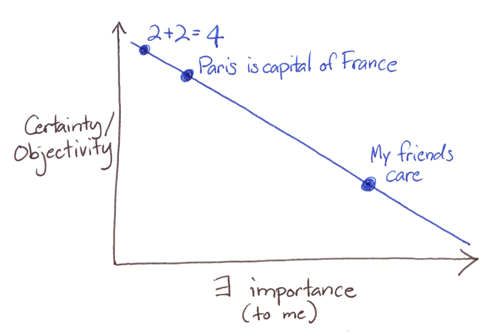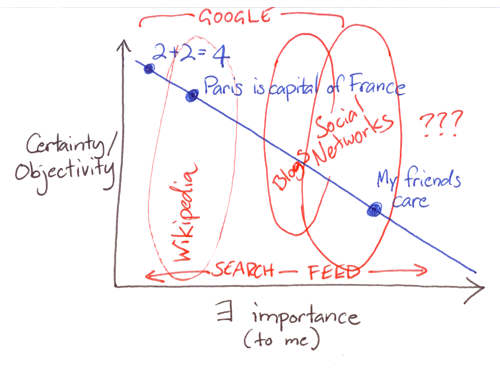Paris is the capital of France. Your friends care about you.
Both statements are probably true, right? But one statement is more objective, more verifiable. The other statement is more important to you, more meaningful to your life.
You can find evidence for one statement in Wikipedia. You can find evidence for the other in Facebook.

Many years ago in a college class about Soren Kiekegaard, the professor explained how Soren said there was an inverse relationship between certainty and existential importance. I drew a graph like the one above to help me remember.
On one extreme you have the facts of logic and mathematics; ultimately provable and objective, but not at all important to me as an individual existing human being. This is the realm of logic. On the other extreme is my eternal happiness; ultimately important to me, but not at all provable or objective. This is the realm of faith. (In the middle lie facts of science and history, childhood memories, and whether my wife loves me.) Soren was arguing against Christian apologetics, but I’ve found myself going back to this model lately when thinking about Wikipedia, Google, Facebook, and the evolution of the web.
The web began as the domain of objectivity, with scientific papers and news sites and other content modeled after the old publisher-consumer model. But the arrival of blogs and social networks began to give us more subjectively interesting information. The content of any given MySpace or Facebook page is meaningless dribble to 99.99% of the web populace. But if your married friend changes their relationship status to “It’s complicated”–as happened to me recently–that’s BIG news!
So what are the trends here?
- We are seeing more subjective information being published online, i.e. more info on the right side of the graph. How far will this go? What more personally interesting information is there? Biometrics? Morale?
- Wikipedia is cornering the market on objective information, i.e. covering the left side of the graph. This led some to speculate that Wikipedia will eat Google.
- Their is more objective information per person than subjective. This means you get objective information primarily via search. RSS readers and Facebook have shown that subjective information is best consumed as a feed. (Imagine the opposite! A Google interface for finding your friend’s favorite bands, or a feed of all new content on Wikipedia!)
Where do we go from here? 
Stan,
Great post! This is some interesting stuff to think about. Thanks for sharing.
Interesting; I think I was struggling for the words to articulate a similar idea in my recent post on maps (http://www.foreignerd.com/2007/09/22/the-need-for-new-maps/), though I think I erred too much on the side of subjectivity. But here’s a question: isn’t “objectivity” simply the subjectivity of certain perspectives and institutions, that is, what certain people (namely, scientists) deem important? Don’t scientists simply have a communal, inter-subjective agreement on, say, the number of electrons in a hydrogen atom, in much the same way that my friends on Facebook have an agreement that I am a pretty cool dude, as it were? Aren’t Google’s search algorithms simply the subjective preference of a very finicky, hackable robot, Larry and Sergey’s subjectivity writ large and encoded? Or am I being too post-modern? 😉
Splendid, Stan…
That’s so very well articulated. I think of my own subjective desires that are so central to my existence that often doesn’t get approved by others around me. Yet I persist, on the realm of my conviction, stimulated by the higher probability of positive outcome that only the dreamer inside me could sense at present. The outside world is far more receptive to net result and cold logic, that does not always contribute to resolution of the existential question or simply, why we are born.
killer stuff as always man. i think what you’re articulating here is similar to what first happened with motion pictures . at first the Lumiere bros and others literally just turned cameras on and recorded what was happening, like the famous train coming into the station. Pretty objective really. this was good enough at first, until people started to find a way to use the technology as another storytelling device and suddenly it became far more engaging if that train pulling into the station had a context and some meaning behind it. And now I’d say its safe to posit that the majority of film/video content is all subjective and narrative…….will the same thing happen to the web?
Would wikipedia ever contain as much info as all the twitter and facebook feeds in the world? Especially as its gets easier and easier to *tell* your story online.
and what does the whole personalized search thing mean in all this? Is it the meeting of the objective and subjective? It’s already pretty weird to do a search for a site I saw a few months ago, and then notice that the entry right next to it displaying the song I was listening to at the time…what’ll it be like when that also lists all my twits and other personalized feeds?
its almost like its going to be getting much easier to objectively record our subjective states and directly broadcast them to the world….memoripedia?
Very good reflection indeed!
But what if objectivity is impossible? If what we now call objectivity is just enough-agreed conventions? I can easily imagine a future in which in a certain subcommunity, members agree on the convention that 2+2=7 another subcommunity in which 2+2=trust and so on.
Then we will see the fragmentation of society Susstein forecasts in “republic.com” and tools on the right side of the graph will be the most important and the one *defining” our society. Be sure to be there with your tools and to behave for what you think is the best interested of the earth …
Interesting post.
You got the point.